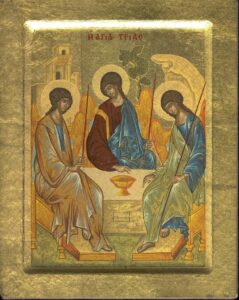 Trinity Sunday St Andrew’s Milngavie 2023
Trinity Sunday St Andrew’s Milngavie 2023
Today we celebrated the feast of the Holy Trinity. In the absence of an organist, Robert did great things technically and we all sang along accompanied to our usual tunes.
Many thanks to all who supported and helped with the flower and music festival yesterday, it was a great success and lovely to see so many people visiting the church and enjoying the festivities of Milngavie week.
This Week
Tuesday – 10am Prayer Group in the Garden Room
Thursday 10am – Said Holy Communion for the feast of Corpus Christi followed by coffee in Friendship House
Saturday 10th June 10.30 – 1pm – Church Cleaning Morning – volunteers required to help give the church a spring clean – coffee and cake provided!
Readings for next Sunday – 1st Sunday after Trinity – Hosea 5:15-6:6 Romans 4:13-25 Matthew 9:9-13,18-26
Today’s Readings – Isaiah 40:12-17,27-31, 2 Corinthians 13:11-13, Matthew 28:16-20
Flower festivals are always such a joy, and this year our festival has been no exception. The displays were beautiful, and many people enjoyed them yesterday as the church was full of visitors observing their beauty and listening to the wonderful music provided by the pupils of the Haydock school of music.
The church was alive and colourful. I’ve always enjoyed colour, and I’ve never quite understood more recent trends for everything to be in greys, black or white but fashions come and go. I can remember as a child my mother had an obsession for green as a result everything in our house was green which rather spoilt the colour for me- blue I decided would be my colour of choice. But for those of you who know about these things, blue is tricky – it’s a colour that can easily clash as I have found out to my cost so now it’s back to green for as I have learnt green is a harmonious colour, it doesn’t clash, it doesn’t argue, its blends.
Most significantly of all it is the default colour of nature AND green is the ecclesiastical colour of the Trinity, the church season which we begin today.
Each church season has a colour, white for celebration – Christmas and Easter. Purple for the sombre and penitential times Lent and Advent. Red for martyrs of Saints’ Days and Passiontide. And green for Trinity. The season of Trinity is often referred to as Ordinary Time and green is chosen as green is the ordinary colour of nature. When the blooms the blossoms and flowers are gone the green leaves remain sustaining the plant. And in the same way when all the major festivals of the Christian year are celebrated and over, we default to ordinary time.
Our lives too are made up of highs and lows, celebrations and sadness, great moments of triumph and joy and then times of despair, fear anguish. But in between we too default to ordinary times – days of routine- monotony even, the plodding on and the getting on – neither ecstatically happy nor miserable.
But it is in these times we still need to know God’s presence, and this is what the Trinity is about – God being with us in the ordinariness of our lives. The Trinity which speaks of the relationship between the Father, Son and Holy Spirit. The father who created us, the son who guides and leads us and the HS who sustains us. The Holy Spirit entering our situations and changing us by its love, brightening up the dull corners of our lives as our flowers brighten up the corners of the church and in so doing raises the mood of our souls.
But what makes this Trinity distinctive is we celebrate a God who did not wish to be distant from us, to reign from on high but a God who chose to be with us in the person of Christ so that he could directly relate to us and we to him. This is what we mean by an incarnational God, a God who lives among us and shares our life in the person of Christ, his son. And so, we also are called to live this incarnational life, a life that is not just focused in church but is out in the world in relationship with others.
This is what makes Christianity so exciting, it’s not simply about praise and worship but it’s about living the incarnational life as Jesus did, living as he did with his disciples in their everyday lives, in relationship with each other. There are times when we may wish to be private in our faith, but we can never be solitary.
The early Christians who we have been reading about in the book of Acts since Easter, very much focused their ministry outside in the open, wandering itinerantly from village to village, spreading the good news of the Lord and going out to meet people, to tell them about Christianity wherever they were in the same way that Jesus taught among the crowds and the people in the markets and in the hills.
Nowadays things are different, we live differently, we have different methods. But in recent years there has been a push within the church to be more missional in our approach to ministry, to try to reach out to people outside the church “To meet people where they are” is often a phrase we hear.
This morning in the gospel Jesus speaks gives his apostles their final instructions, “Go therefore and make disciples of all nations …. And remember I am with you always to the end of the age” Matthew 28:20
Those great words of the commission which Jesus gave to his disciples all those years ago, today speak to us on high days and holidays and just as importantly they speak to us in the ordinariness of our everyday lives.
